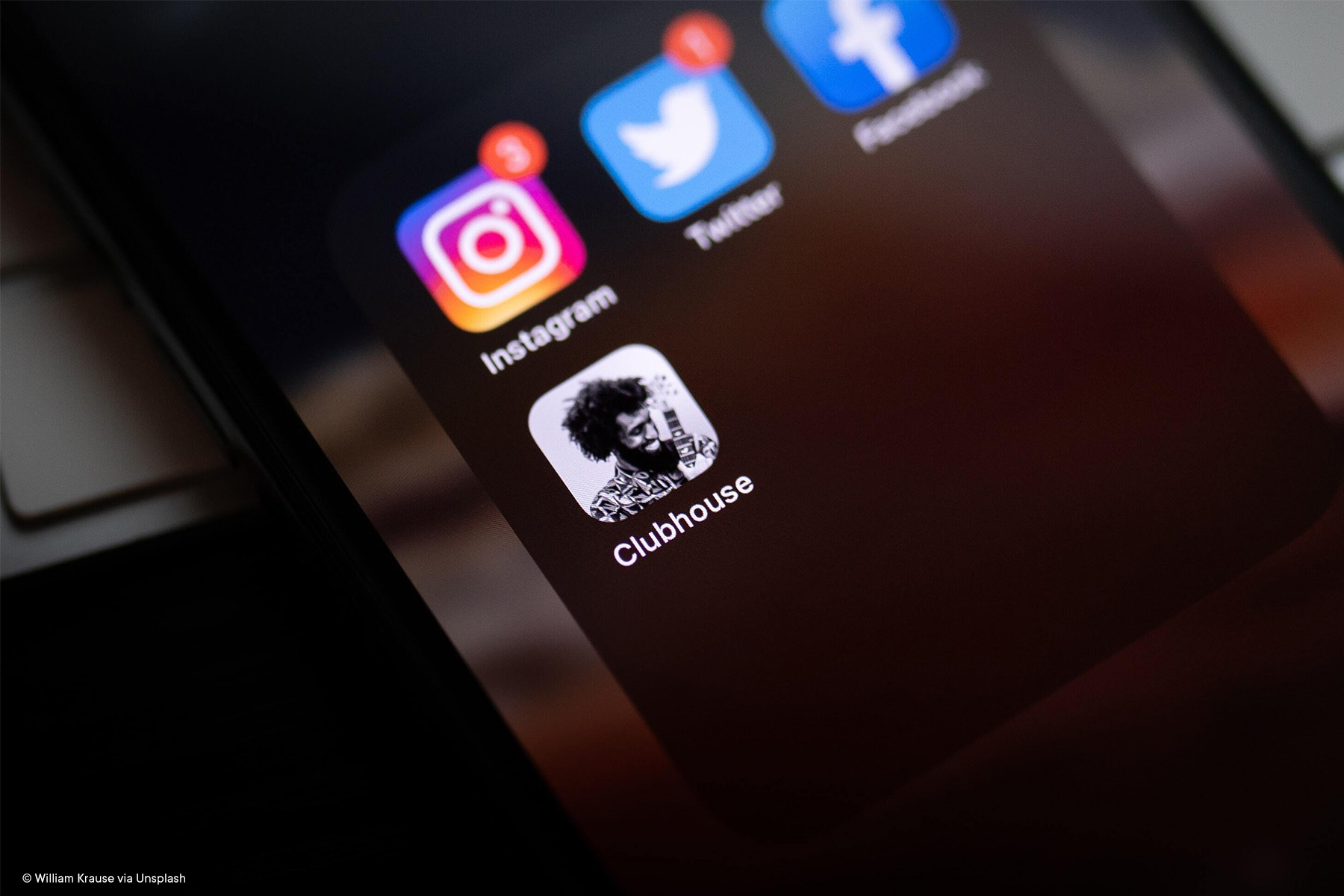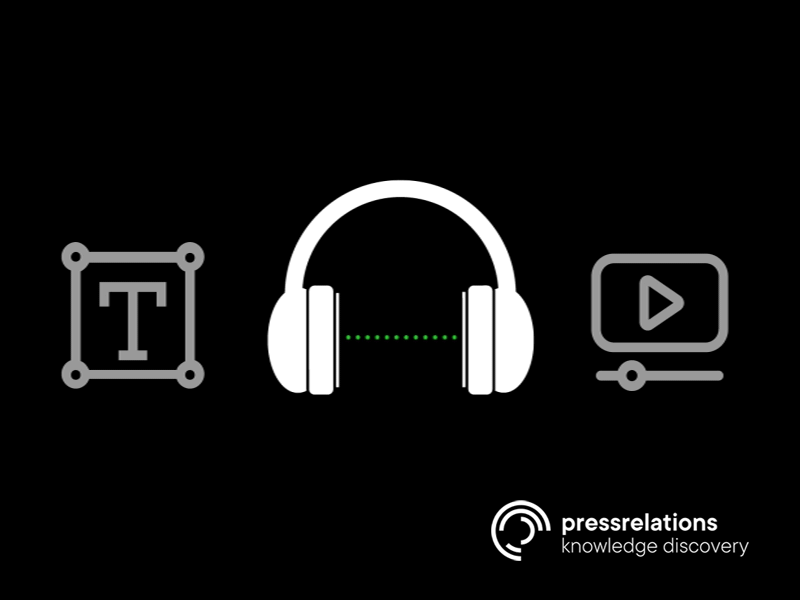Everyone wants in, but most people are still locked out. Anyone who wants to listen in on the new live podcast app Clubhouse needs an exclusive invitation. At the moment, young people, PR professionals, social media marketers, and many others are networking on the platform to discuss all things digital. We at pressrelations want to find out what’s behind the hype surrounding the new audio platform and why so many people find the hour-long exchange of opinions with complete strangers so fascinating right now.
Clubhouse has been around in the USA since the beginning of 2020 and the hype surrounding it has been spreading rapidly ever since. Those who are not already addicted to the concept of Clubhouse will become curious at the latest when the word “Invite” is mentioned because without an invitation from already registered users you can’t get in. Our invitation came faster than expected — we joined via automated SMS, and we were ready to go.
What Is This Clubhouse, and Where Does Its Appeal Come From?
Not only listening to podcasts but also being able to join in the conversation – people with a great need to communicate due to the current situation feel strongly attracted to this concept. It’s no wonder, then, that influencers, creators, and motivational speakers are also found here alongside ambitious young entrepreneurs. Live podcasts are available on a wide variety of topics such as lifestyle, wellness, art, entertainment, and travel, but technical, political, and scientific discourse is also present. Large or small groups, so-called “rooms,” can be created by all users and given a title that defines the topic of the talk. Each user can decide for themselves whether they would like to appear as a speaker in a talk or whether they would prefer to remain “downstairs” with the silent audience.
It’s amazing how easy it is for us to leave our observing position and participate publicly on Clubhouse. Here, the tone is relaxed, people understand each other, discuss matters objectively, thank the other speakers for their contributions and behave courteously. All of this creates a sense of familiarity and makes Clubhouse seem like a safe place where no one has to worry about what is said being construed negatively. General agreement with statements is signaled with the quick on and off of the microphone, a kind of applause. Applause for one’s own thoughts, one’s own views, and, in the case of personal issues, for one’s own courage and strength. Particularly respectful interaction prevails in smaller rooms: one usually lets one’s fellow speakers finish speaking, behaves courteously, and explicitly asks all participants for their individual opinion on the current topic. Because of this sudden intimacy, it is not surprising that many of our fellow speakers share personal experiences, moral convictions, and intimate feelings without inhibitions after only a short time. Thus, in a room called “Deep Talk,” more than 60 people quickly end up verbalizing private topics publicly and sharing intimate details as if it were the most normal thing in the world. The speed with which strangers on Clubhouse engage on such a personal level is remarkable. If you follow people whose input particularly resonates with your own beliefs, the app will notify you in the future as soon as they join a talk again or open their own discussion spaces. In this way, users have the opportunity to build their own network of inspiring or simply pleasant personalities and to stay in touch with them.
A Bubble of Exclusivity
In addition to people who are hardly influential in the media space, you can also quickly meet successful CEOs, Instagram stars, and TV personalities on Clubhouse who talk about topics such as start-ups, career paths, or Instagram strategies and willingly share their knowledge with anyone who wants to hear it. Unlike Instagram, Facebook, or Tiktok, on Clubhouse you get the chance to talk directly with these personalities, depending on the size of the group. What’s impressive is the openness and willingness with which well-known and lesser-known users exchange views on all kinds of topics in a relaxed chatty tone, regardless of their position in the public eye. On platforms like Instagram, where followers, likes, and comments carry a lot of weight, that would be unthinkable.
It is precisely this feeling of exploring a new and hot social network as pioneers that, as we can hear from many talks, also captivates other users, especially numerous digital-savvy people who predict that Clubhouse will be the new star in the social media sky. Where else can you listen to a star like Paris Hilton chatting unscripted or ask social media experts questions for free?
As the app’s popularity grows and the hype expands, it’s questionable whether Clubhouse will linger in its bubble existence much longer. The launch concept should look familiar to many social media users: When Google launched its extension network Google+ in the summer of 2011, registration was also by invitation only. In the summer of 2013, Google+ was the second largest social network in the world. Over the years, Google+ has seen high user numbers, but little real engagement. When serious data protection issues arose in October 2018, the platform was finally shut down. Since the Clubhouse app is already showing numerous violations of the General Data Protection Regulation, it could soon meet a similar fate. Moreover, it remains questionable whether the app will be used with as much enthusiasm by people outside the digital scene or whether the Clubhouse phenomenon will only be able to keep media-savvy individuals in line in the long term.
Currently, the application is only available for Apple devices, but with the opening for Android, numerous new members will soon populate Clubhouse. It can therefore be assumed that the number of small rooms will decrease with the general increase in the number of users and that exclusive panels, especially with prominent participants, will become increasingly rare. But until then, Clubhouse will be ruled by the appeal of being able to discover the app effortlessly, exclusively, and side by side with well-known stars and successful entrepreneurs.
What Is Necessary for You to Register?
Exclusivity instead of inclusion – the Clubhouse principle is causing a wave of criticism, and not just in this country. The app has so far systematically excluded certain groups of people, such as Android users, and does not currently offer any alternatives for the deaf that make it possible to use the app despite physical limitations. But Clubhouse’s biggest shortcoming is data protection — it is not possible to register without entering one’s own phone number and granting the app access to the entire contact list. Moreover, it is easy to lose control over what personal data is shared with other users. We have already revealed our names, faces, professional interests, and hometowns. From other users, we learn about personal desires and fears, complicated careers, failed relationships, and stressful illnesses. Clubhouse explicitly requests that all users register with their real names, and so far it seems that all of them have complied. I wonder if sharing this information is so easy precisely because people don’t know them and therefore assume they won’t be judged? Or is it just that in this time of lockdown, we all have an increased need to share our opinions and how we feel with the public since we are all in the same boat because of the virus?
Clubhouse as the Lockdown’s Sweet Temptation
The current popularity of the platform is mainly due to the timing of its release: In the middle of the coronavirus lockdown, which makes it virtually impossible to maintain social contacts, the chatting app hits like a bomb. Due to the contact restrictions, many users seem to have a huge need to communicate. The friendliness and openness that we encounter almost everywhere on Clubhouse certainly arise from the joy of finally being able to get in touch with people again and have truly multi-voiced discussions. The desire for deep and meaningful connections is reflected in the way speakers open up and address highly personal, as well as philosophical, concerns. Clubhouse users want to share and be heard but listen to their fellow speakers with as much enthusiasm as they express themselves. People with difficult fates or acute problems receive a lot of encouragement and support, while people with success stories are complimented for their strength and assertiveness. It almost seems as if no one is being judged here – but since the Instagram profile can be linked and is thus only a click away, it is also possible here to form a visual impression and thus a potential judgment after all.
A Digital Advertising Platform for Business
In the numerous clubs and rooms on topics such as marketing, business, startups, or social media, experts, specialists or simply interested people meet to share experiences, ask questions or give tips. The app acts like a mixture between LinkedIn, Telegram, and the popular podcast platforms. The profile descriptions of the speakers and listeners provide information about their profession, position, skills, and areas of interest. When well-known or professionally successful people open up a space, a larger audience is quickly created, which pesters the speakers with business questions and thus also consolidates their position as mentor or idol in the eyes of other users. The opportunity to ask successful and almost elitist personalities about their position and career adds to the appeal of Clubhouse and for the first time enables a direct and free transfer of knowledge between people in different positions and stages of life. Students chat with CEOs, while national players provide amateur soccer players with nutrition tips and TikTok influencers explain how best to position oneself on the platform. But Clubhouse also acts as an extension of Instagram: When the account is linked on the Clubhouse profile – of course by granting Clubhouse unrestricted access to it – other users can get a picture of the person they are listening to. Those who are already successful on Instagram can use Clubhouse as a complementary community-building measure and start conversations with followers or with target groups as well as companies in similar industries.
So far, a lot of free knowledge has been offered and disseminated on Clubhouse, which is probably due to the fact that the app itself does not yet offer any monetization options and the sudden attention and recognition seems to be enough for many speakers for now. This inevitably leads to bragging and glorifying self-promotion, which, however, has rarely been denounced due to the respectful interaction on Clubhouse in our experience. Differing opinions are generally met with respect and tolerance here, and the social differences between students, coaches, stars, or CEOs hardly play a role. Nevertheless, it is noticeable that the intentions of many users are of a business nature: startup founders promote their own business in their talks or try to recruit potential employees. Advice and assistance are certainly not only given out of friendliness, but in connection with clear advertising intentions. The boundaries between the professional and the private spaces are blurred, and both spheres influence one another.
The intimate atmosphere that quickly arises in many Clubhouse talks fosters authentic communication in a supposedly personal environment, which is why the potential of Clubhouse as an advertising platform should not be underestimated. At the same time, non-business users are more easily influenced and thus unconsciously engage in sales talks, which would be much less likely on the open street. For network marketers, in particular, Clubhouse is, therefore, the ideal platform for making new contacts and promoting their own business. Nevertheless, especially in this early phase of the app, it is quite possible to acquire knowledge from a wide variety of fields and to talk to experts or decision-makers to whom one would otherwise not have access, especially as part of professional training. Clubhouse talks have a webinar nature, offer real added value, and can thus generate interest among potential customers or employees by sharing valuable information. In addition, there is the opportunity to open up new potential career paths by making contacts and to develop an increased interest in professional matters.
Why Is the Concept of Clubhouse Better Than That of Facebook, Instagram & Co.?
The private atmosphere in many Clubhouse rooms is hardly comparable to that in other social networks and even exceeds the personal level of conventional podcasts due to the live character and the possibility to have a say. In contrast to the staged world of images on Instagram, much of Clubhouse’s content offers real added value, and the audio experience is in the spotlight. Since the users initially only participate with their voices, names, and profile pictures and there is no video option, the persistent illusion arises that one is not revealing too much about oneself after all, which is of course the case through personal statements. In general, the barrier for sharing personal details seems to be much lower in face-to-face conversations than in text formats such as Twitter or Facebook. While what is written remains, what is said fades away as quickly as it was uttered, and therefore cannot be misused for questionable purposes – unless it was recorded. But Clubhouse knows how to prevent that by displaying a warning as soon as the screen recording button is clicked. However, to what extent Clubhouse records the talks itself is not entirely clear and can be highly problematic from a data protection perspective.
Conclusion — Top or Flop?
Although the app harbors dangers, such as the misuse of sensitive data, unwanted influence on users through veiled advertising intentions, and the careless sharing of private information and inappropriate statements, its potential should not be underestimated. Clubhouse facilitates the transfer of knowledge between people from all social groups and companies from a wide range of industries, opens up new spheres for further education, and creates social exchange opportunities that we all need more than ever in these times. The exclusivity of the app is currently increasing the hype immeasurably, while inclusion is falling by the wayside. Clubhouse’s infrastructure fosters the emergence of a supposed “elite” that also sees itself as such and wants to be seen as a pioneering community. But this phenomenon should neutralize itself with the opening of the app for Android devices and its further spread. It also becomes problematic if radical political groups or lateral thinkers discover the app and use the live podcast format to organize themselves publicly. Here, it is up to the developers to prevent any kind of misuse. In addition, commercialization of the app is conceivable in the future, whereby problematic data trading could ensure that advertisements are not needed. Therefore, it remains to be seen whether the app will hold up at all in the long term, but since Clubhouse is still in beta, the option for changes remains open. In principle, Clubhouse definitely has the potential to become the “next big thing” due to its innovative structure and the highly positive response, securing a firm place for itself alongside Instagram, Facebook & Co.






